Today, networking on the Internet is equally important for all real estate agents and agencies. 27% of the respondents used real estate agents to search for and purchase homes. However, according to NAR, 97% of home buyers use the Internet in their search.
Real estate website marketing, if properly designed, can be the centerpiece of your marketing campaign because it gets your clients and markets your properties in an appropriate manner. According to Grand View Research, the real estate market was valued at USD 3.69 trillion in 2021 and is expected to grow at a compound annual growth rate (CAGR) of 5.2% from 2022 to 2030.
Importance of a Real Estate Website
- Visibility: A website serves as your locator and in one way or another, potential clients get to stumble into your website.
- Credibility: The creation of a professional website dispels the audience's doubts and forms a favorable opinion.
- Lead Generation: Leads can be collected via contact forms, listed pages and other links placed on social networking sites.
- 24/7 Access: Unlike a physical office, a website can function 24 hours a day, 7 days a week, giving clients a chance to browse the listings whenever they want.
Types of Real Estate Websites
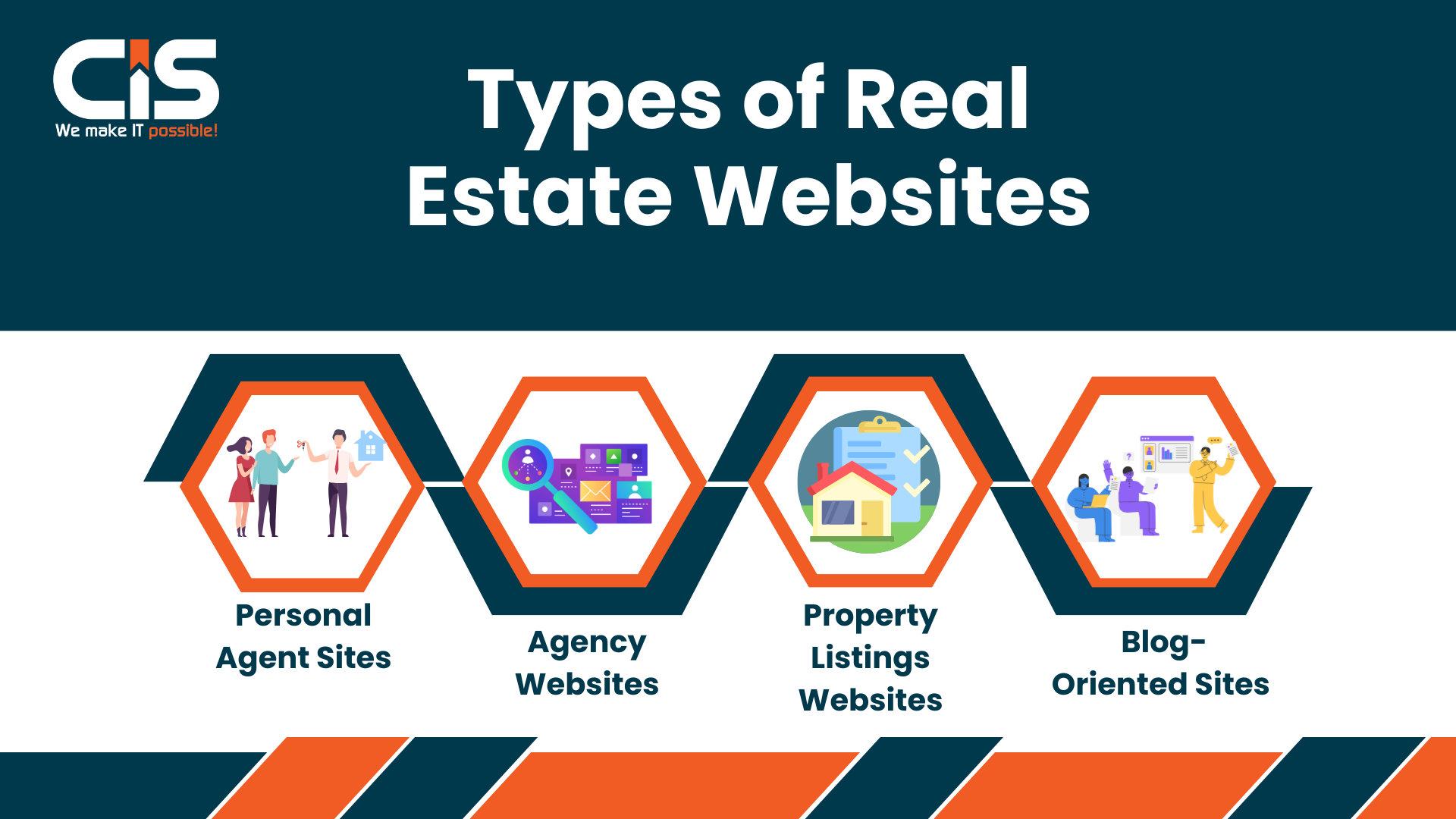
Personal Agent Sites: Focused on individual agents Listing of past sales and victories
Agency Websites: Should be able to present multiple agents and many listings. Scheduling applications and inquiring applications
Property Listings Websites: The primary focus of the client is property listings that are available for sale or for renting. Many have even more superior search options.
Blog-oriented sites: Offer the market information and tricks. Acquire more traffic from the origin naturally by providing useful content.
Read More: Real Estate Apps: Worth the Investment? Discover the True Cost of Development!
Key Components Influencing Costs
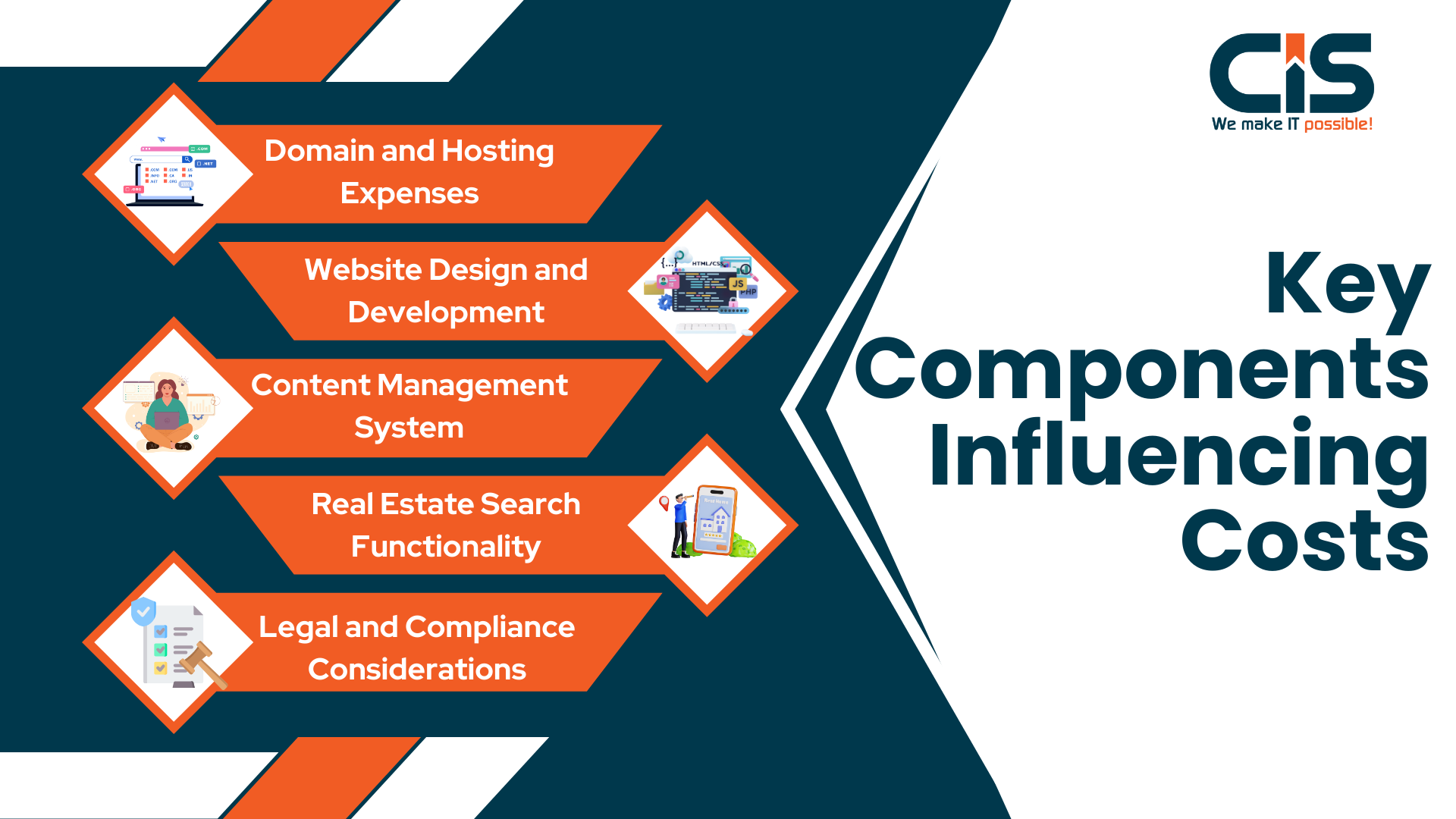
There are several components that are directly related to website building in the sphere of real estate and that might contribute to the general cost. That is why understanding these elements can increase your possibility of creating an effective budget.
Domain and Hosting Expenses
When estimating the real estate website cost, it's essential to consider domain and hosting expenses as a significant part of the budget.
Domain Name:
A domain name is the actual name of your site, which everyone will type in his/her web browser. Prices can average at $10 to $50 per year, depending on the specific registrar selected and type of domain, be it.com,.net, or the rest.
Hosting Options:
-
Shared Hosting:
- Low-cost solution: recommended for use by low-traffic websites.
- Estimated Cost: 10 to 30 cents a day or $3 to $10 per month.
-
VPS (Virtual Private Server) Hosting:
- Furnishes more contents and better quality.
- Estimated Cost: It costs just between the amount of $20 to $100 per month.
-
Dedicated Hosting:
- Best for high-traffic websites.
- Estimated Cost: $100 to $500 on a monthly basis.
Yearly Cost Summary
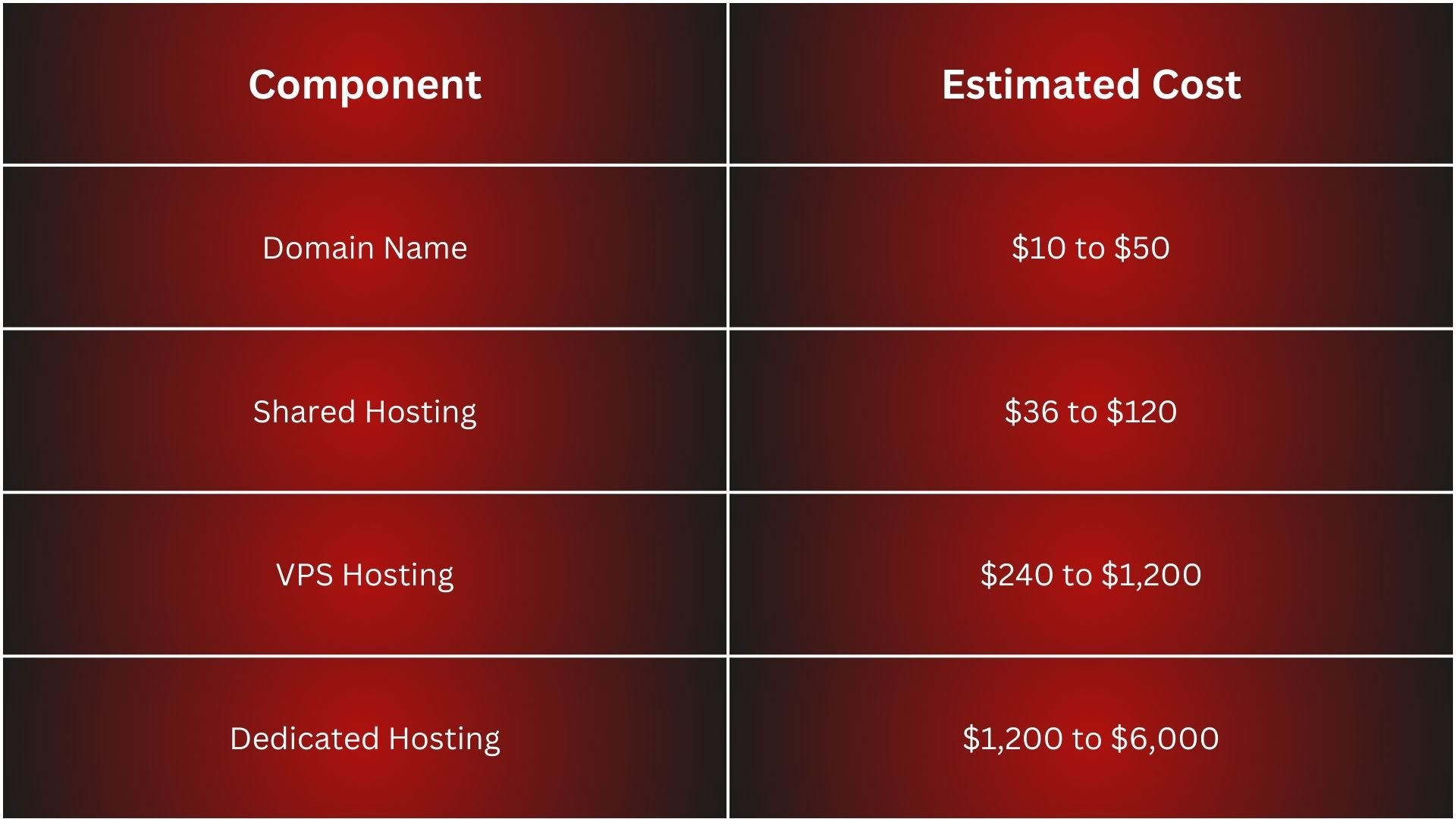
Website Design and Development
To build real estate websites, cost can vary significantly, depending on the complexity of the website design and development requirements. According to a survey by Clutch, 46% of small businesses invest between $1,000 and $10,000 in website development.
Custom vs. Template Design
-
Custom Design:
- Tailored to specific brand needs.
- Unique layout and features.
- It may be as little as $5,000 or as much as $30,000.
-
Template Design:
- Based on pre-existing layouts.
- More cost-effective and faster to deploy.
- Typical costs range from $500 to $5,000.
Costs of Hiring a Designer/Developer
-
Freelancers:
- $20 to $150 per hour, depending on experience.
- Ideal for smaller projects or budget-conscious businesses.
-
Design Agencies:
- $100 to $300+ per hour.
- Provide comprehensive services and expertise.
-
Fixed Price Projects:
- It can range from $3,000 to $50,000 based on complexity.
DIY Website Builders vs. Hiring Professionals
-
DIY Website Builders:
- User-friendly interfaces (e.g., Wix, Squarespace).
- Subscription costs $15 to $50/month.
- Limited customization options.
-
Hiring Professionals:
- Offers personalized service and tailored solutions.
- Investment of time and budget but results in higher quality.
Factors Affecting Design Complexity
-
Features:
- IDX/MLS integrations for property listings.
- Advanced search filters and interactive maps.
-
Mobile Responsiveness:
- Essential for user experience.
- Adds to development time and cost.
-
Content Management System (CMS):
- WordPress, Joomla, or custom CMS options.
- Custom CMS can increase development costs significantly.
Content Management System (CMS)
Content Management System (CMS) is crucial for managing a real estate website effectively. The average cost to build a real estate website using a Content Management System (CMS) can vary widely depending on the complexity and features required.
Here are a few popular CMS options:
-
WordPress
- Highly customizable and flexible.
- An extensive plugin ecosystem for additional functionality.
-
Wix
- User-friendly with built-in templates.
- Ideal for those with minimal technical skills.
-
Squarespace
- Sleek design options with drag-and-drop features.
- Less customizable than WordPress but great for visual appeal.
Licensing Fees for Premium Themes and Plugins
Using premium themes and plugins can enhance your site's functionality significantly. Here are some cost breakdowns:
-
Premium Themes
- Average cost: $30 to $100 (one-time fee).
- Offers unique designs and enhanced features.
-
Plugins
- Essential for specific functionality (e.g., IDX integration).
- Prices range from $15 to $300 per year.
Comparison of Costs Between Different CMS Platforms
Here's a quick comparison table for better insight into the cost expectations of different CMS platforms:
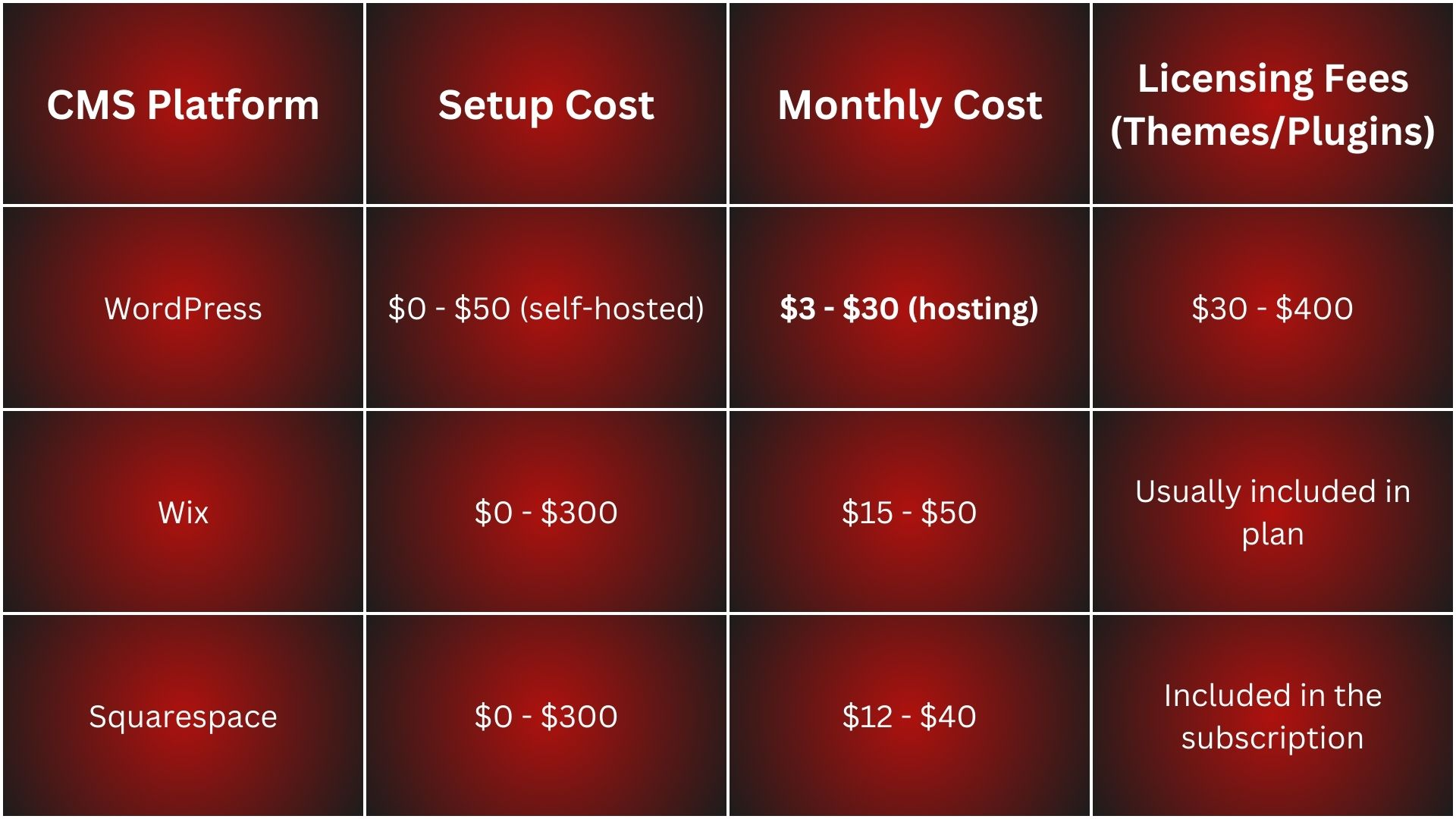
Real Estate Search Functionality
To estimate the cost of creating a real estate website, consider the essential real estate listing features that will enhance the site's functionality and user experience. According to Statista, the residential real estate market worldwide was projected to reach a value of US$0.52 qn by 2024. It is expected to reach US$0.60qn by 2029 at a CAGR of 2.90% (2024-2029).
A powerful search feature is crucial for any real estate website. According to a survey from the National Association of Realtors (NAR), 74% of home buyers say that property search tools are a key factor in their online experience.
Importance of Real Estate Search Functionality
An effective search function enables users to:
- Filter properties based on various criteria (e.g., location, price, number of bedrooms).
- Sort listings to find results that match their preferences quickly.
- View detailed property information, including images and descriptions.
Key Features of Real Estate Search Functionality
When building your real estate website, consider incorporating the following features in the search functionality:
- Map Search: Allows users to visually explore properties on a map.
- Advanced Filters: Options to filter by property type, amenities, and more.
- Saved Searches: This enables users to save their search preferences for future use.
- Email Alerts: Notifies users about new properties matching their criteria.
- Mobile-Friendly Design: Ensures the search function is easy to use on mobile devices.
Cost Breakdown for Search Functionality
Budgeting for search functionality can vary based on complexity and features. Here's a basic cost estimate:
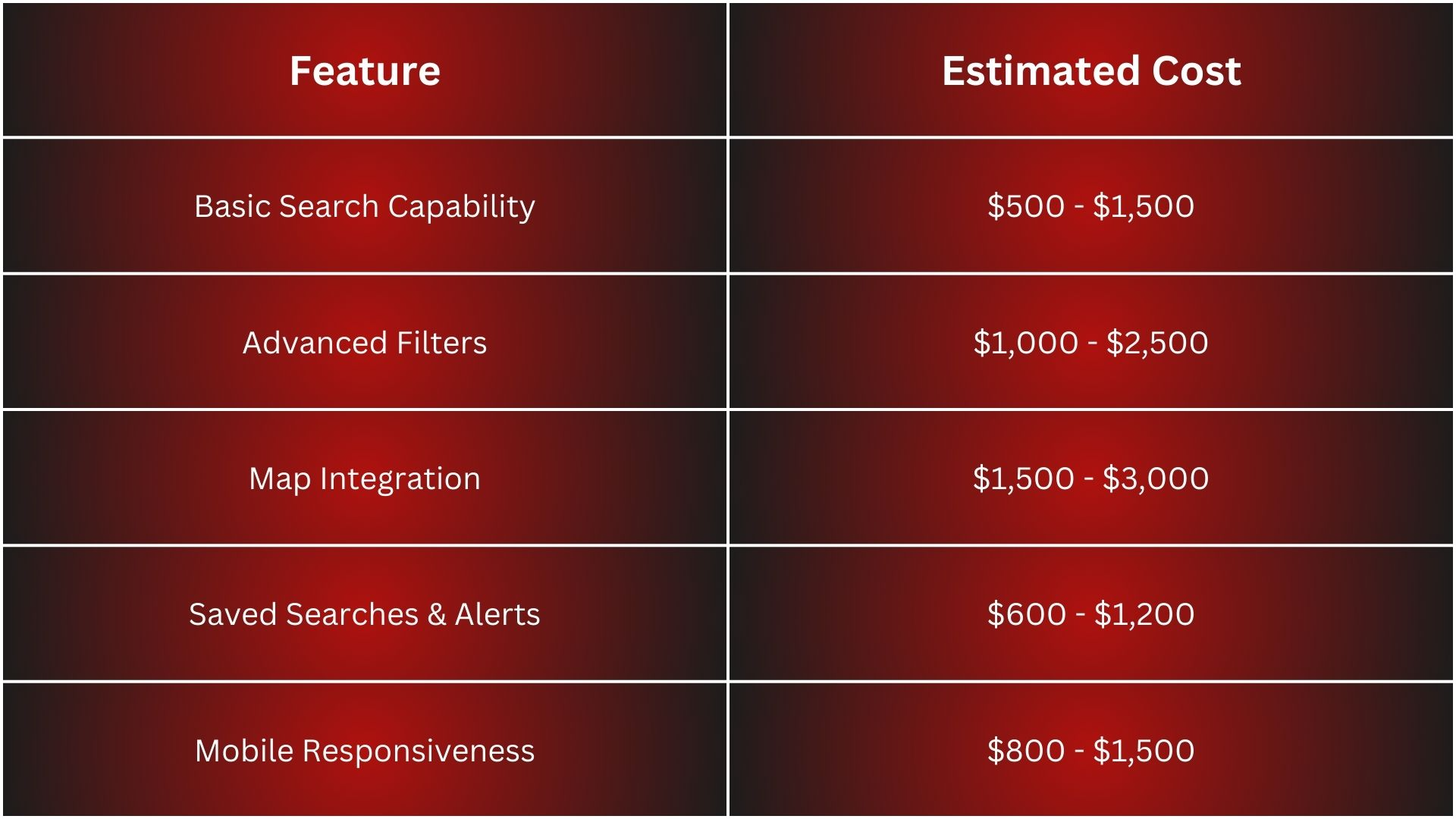
Legal and Compliance Considerations
Developing a real estate website is not only about its look or provided features and options. Legal requirements must be considered at all times, especially when it comes to customer data and accessibility concerns.
When creating a real estate website, it is crucial to consider both the cost to make a real estate website and the legal and compliance considerations to ensure that the site is functional, secure and adheres to industry regulations.
ADA Compliance Costs
The law of the United States of America, namely the Americans with Disabilities Act, states that the sites have to be made accessible for such persons. Noncompliance with these rules can lead to cases or penalties.
- Estimated Costs: Between $2,000 to $25,000, depending on the level of compliance that was required.
- Key Components: Alt text for images, captions/subtitles for media objects, and keyboard-navigable features ensure accessibility and enhance the user experience effectively.
Privacy Policy and Terms of Service Requirements
It is indispensable to note that any site that deals with personal information must have a privacy policy and terms of service. These are documents that demonstrate how the personal information of users is gathered, employed, as well as preserved.
- Estimated Costs: $300 - $1,500 for the lawyer consultation and preparation of legal documents.
- Key Components:
Clear Data Collection Practices: Some of the general rights and choices available to users of the platform concerning their data.
Real Estate-Specific Regulations
Thus, it can be stated that real estate websites should adhere to certain rules and requirements specific to this industry. These are also state-specific and may contain the rules of advertising and fair housing provisions.
- Estimated Costs: $500 to $3,000 to guarantee that the company complies.
-
Key Components:
- Motifs such as the fair housing logos and catchphrases. Awareness of property characteristics is a plus in portraying correspondingly explicit characteristics concerning the property in sales. Data on licensing of real estate agents.
Ongoing Costs
As we stabilize on the permanent factors that have to do with the creation of a real estate website, it is also relevant to attach higher value to recurrent costs. Such expenses act as important factors in the total budget.
Maintenance and Updates
It is necessary to point out that maintenance of your website is crucial to its stable work. This includes:
- Security Updates: Securing your site from various breaches is always important.
- Bug Fixes: Problems are attended to immediately, hence high productivity is achieved.
- Content Updates: Cohesion is important to maintain because property listings must always be updated with relevant information.
Estimated Costs: The basic charges for monthly maintenance costs for a condominium fall between $100 to $500. However, the annual maintenance may range from $1,200 to as much as $6,000.
Marketing and SEO
With the aim of getting visitors to your site, you need to spend money on advertisement, search engine marketing, optimization, or SEM & SEO. Consider the following:
- SEO Budget Allocation: The objectives ultimately lie in enhancing the search engine rankings to favor your site.
- Pay-Per-Click (PPC) Advertising: A fast solution for boosting the visitors.
Estimated Costs:
- Monthly SEO services can cost anywhere from $300 to $2,500.
- PPC expenses may run from $500 to $2,000 monthly, depending on competition.
Ongoing Content Creation
Content is king in the real estate industry. Regularly updating your blog with valuable insights can engage potential clients.
- Blogging: Aim for at least monthly posts.
- Visuals: For listings, make use of excellent photos and videos.
Estimated Costs:
- Hiring a freelance writer may cost $50 to $100 per article.
- Investing in professional photography can range from $250 to $1,000.
Social Media Integration and Management
Social media is an effective platform for real estate agents. Proper management can enhance your reach and customer engagement.
- Platform Selection: Focus on where your audience is (Facebook, Instagram, etc.).
- Scheduled Posts: Use tools to automate your social media presence.
Estimated Costs:
- Monthly management by a professional can range from $200 to $2,000.
- Tools for scheduling and analytics may cost an additional $20 to $100 per month.
Summary Table of Ongoing Costs
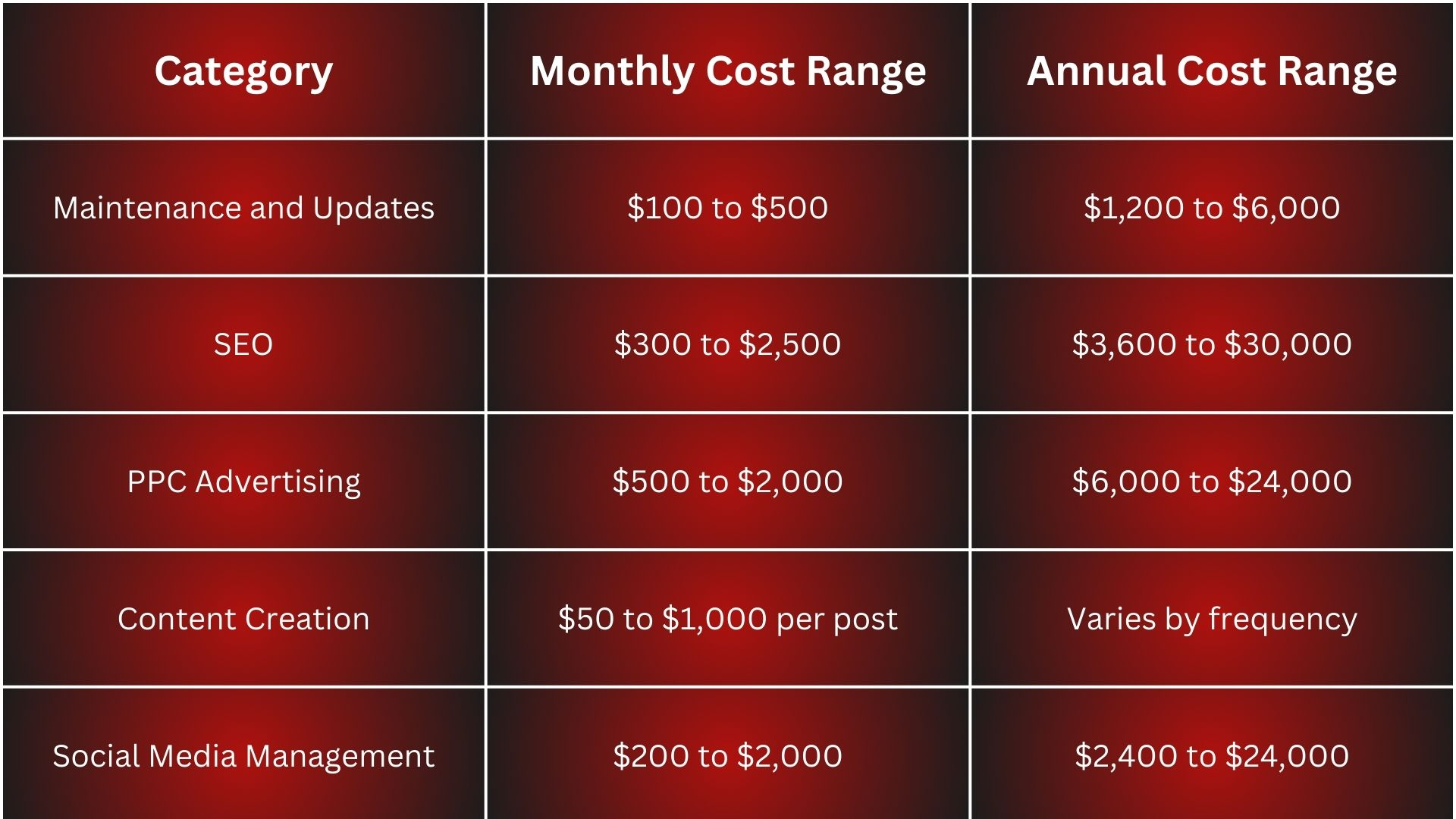
Cost Range Overview
Building a real estate website involves various costs depending on its complexity and features. Here's a breakdown:
Price Ranges by Website Type
-
Basic Websites ($1,000 - $3,000)
- Simple design.
- Limited features (e.g., property listings, contact form).
- Ideal for individuals or small businesses.
-
Advanced Websites ($3,000 - $10,000)
- Enhanced features (e.g., search functionality, integrated MLS).
- More professional design options.
- Suitable for growing real estate firms.
-
Custom Websites ($10,000 - $50,000+)
- Fully tailored design and features.
- Advanced content management systems and user experience enhancements.
- Best for large agencies with specific branding and functional requirements.
Typical Costs for Website Scale
-
Small-Scale Websites:
- Costs around $1,000 - $5,000.
- Perfect for startups or agents focused on local markets.
- Include basic elements like:
- About page
- Listing page
- Contact form
-
Large-Scale Websites:
- Costs can exceed $10,000.
- Designed for larger agencies targeting multiple markets.
- Features may include:
- Multiple Listing Service (MLS) integration.
- User accounts.
- Property alerts and advanced search filters.
Potential Return on Investment (ROI)
Investing in a real estate website can yield significant returns through lead generation.
- Lead Conversion: A well-optimized site can convert visitors into leads, increasing your client base.
- Visibility: A professional website enhances credibility, leading to more referrals and repeat clients.
Marketing Synergy: Integrates with other marketing efforts like social media and email campaigns for broader outreach.
How Can I Promote My Real Estate Website?
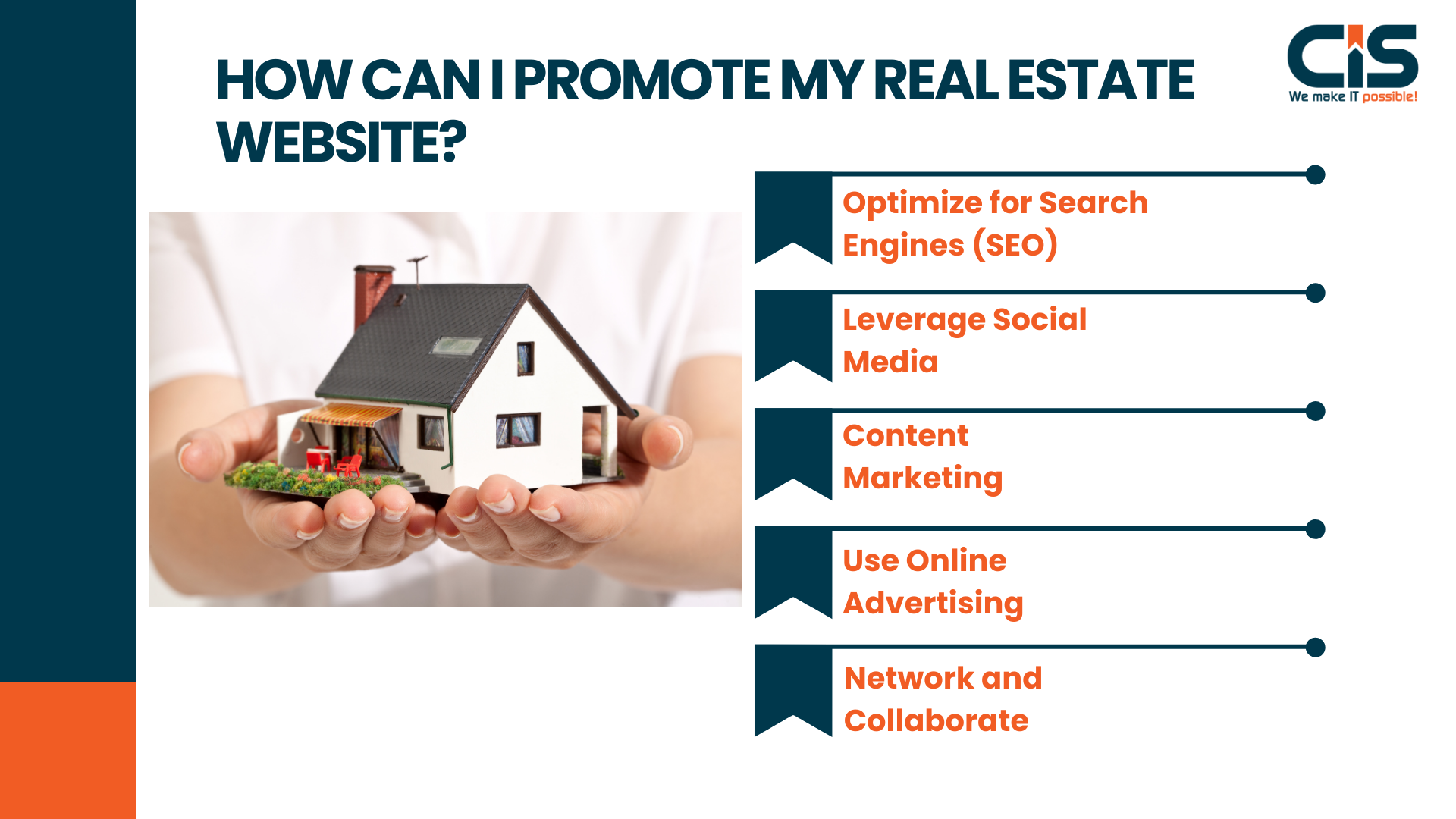
Promoting your real estate website effectively is crucial for attracting potential buyers and sellers. Creating the best real estate website design requires attention to detail and user experience. Here are key elements to consider:
Optimize for Search Engines (SEO)
- Tools: Use tools like Google Keyword Planner to find relevant keywords when conducting keyword research.
- On-Page Optimization: Include keywords naturally in headers, titles, and content.
- Meta Descriptions: Write intriguing meta descriptions to entice readers to click.
- Use Alt Text: Optimize images with descriptive alt text.
Leverage Social Media
- Create Profiles: Set up accounts on platforms like Facebook, Instagram, and LinkedIn.
- Share Listings: Post engaging content such as property listings and market insights.
- Interaction: Interact with the audience by quickly answering questions and leaving comments.
Content Marketing
- Blogging: Publish informative articles about buying/selling tips and local market updates.
- Video Content: Create virtual tours of properties or video testimonials from clients.
- Email Newsletters: Send regular updates with valuable content to your subscribers.
Use Online Advertising
- Google Ads: Consider pay-per-click campaigns to appear at the top of search results.
- Social Media Ads: Target specific demographics with ads on social platforms.
Leverage Local SEO
- Google My Business: Claim and optimize your business listing.
- Citations: Get listed on local directories and real estate websites.
Network and Collaborate
- Partner with Local Influencers: Collaborate with community figures to reach a broader audience.
- Attend Events: Participate in local real estate events and share your site.
How Long Does It Take to Build a Real Estate App?
Building a real estate app can significantly enhance your business and improve the user experience. Industry data indicates that 75% of consumers prefer mobile-friendly sites for their property searches.
The timeline for developing a real estate app typically ranges from 3 to 9 months, depending on several key factors.
Factors Influencing Development Time
-
Complexity of Features
- Basic Features (search functionality, property listings): 3-6 months.
- Advanced Features (integrated payment systems, real-time chat): 6-9 months.
-
Customization Level
- Off-the-Shelf Solutions: Quicker to implement, generally around three months.
- Fully Customized Apps: Lengthier process, potentially 6-9 months.
-
Development Team Experience
- An experienced team can lead to faster delivery.
- Less experienced teams may take additional time for iterations.
-
Platform Choice
- iOS vs. Android: Building for both platforms may add to the timeline.
- Cross-Platform Solutions: Can reduce development time to around 4-6 months.
-
Testing and Revisions
- Initial testing may take 1-2 months.
- Iterations and bug fixes can extend development time.
Typical Development Process Breakdown
- Planning Phase: 2-3 weeks
- Define app goals and target audience.
- Gather requirements and create wireframes.
- Design Phase: 4-6 weeks
- Create visual elements and user interface designs.
- Develop user experience flows.
- Development Phase: 2-5 months
- Code functionalities based on design specifications.
- Implement necessary third-party integrations (e.g., MLS APIs).
- Testing Phase: 4-6 weeks
- Perform quality assurance and user testing.
- Address any issues or bugs.
- Launch Phase: 2-4 weeks
- Final preparations for submission to app stores.
- Develop marketing strategies for the launch.
Conclusion
Building a real estate website is not just about establishing an online presence; it's a strategic investment in your business. The costs of creating a real estate website can vary widely based on several factors, including the complexity of features, design preferences, and whether you choose a custom-built solution or a template.
On average, small to midsized real estate websites can range from $3,000 to $15,000, while more expansive platforms with advanced functionalities may soar to $25,000 or more.
It's essential to remember that, beyond the initial investment, ongoing maintenance and updates are critical for keeping your website relevant and functional in the evolving real estate market.
Engaging a professional development team can streamline the process and ensure you receive a quality product tailored to your needs.
If you're ready to take your real estate business to the next level with a tailored website, reach out to CISIN. Our expert team is dedicated to crafting high-performing, user-friendly websites that turn visitors into leads.





